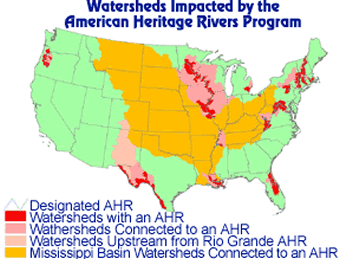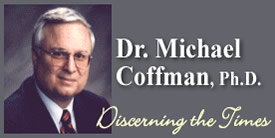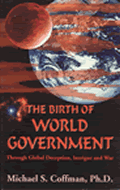Other
Coffman
Articles:
Return to
Earth Worship,
Part 1
How Government Regulations Threaten America
SEPARATING PEOPLE FROM THEIR WATER
By
Dr. Michael S. Coffman Ph. D.
January 22, 2004
NewsWithViews.com
As the United Nations restructures itself to become a world government vis-a-vis global governance, it is being formed around the principles of sustainable development as defined by Agenda 21. Signed by the U.S. during the Earth Summit at Rio de Janeiro in 1992, Agenda 21 is a 40-chapter manifesto to reorganize the world using socialist and pantheistic principles to protect Earth .
Agenda 21 represents a major fundamental change in the role of government in social and land-use policy. Under its concept of sustainability, the primary purpose of government will no longer be to serve the people. Rather, the focus of Agenda 21 is to protect nature from people. Governance will be by consensus among "stakeholders and partnerships." The concept of elected representation that holds the government accountable to the citizens will be eliminated.
Agenda 21 requires that by 2000 "All States...have designed and initiated costed and targeted national action programmes, and to have put in place appropriate institutional structures and legal instruments� to implement Agenda 21. The Clinton Administration responded creating the President's Council on Sustainable Development which published its report entitled Sustainable America in 1996. Chapter 18 of Agenda 21 requires that all States implement integrated watershed management plans "for the protection and conservation of the potential sources of freshwater supply, including � protection of mountain slopes and riverbanks and other relevant development and conservation activities.�
The Clinton Administration eagerly took up the challenge. In the U.S. State Department's 1997 report on its progress to the UN, the U.S. proudly stated, �Agenda 21 sets ambitious objectives [for the United States to] � move toward integrated water resource management, a holistic approach that treats water resources as an integral part of the ecosystem.� Among the many programs spawned by Sustainable America to fulfill the fresh water protection requirements of Agenda 21 include the American Heritage Rivers (AHRI), and the Clean Water (CWI) initiatives. Neither program was voted on by the U.S. Congress. Instead, they are being implemented through executive order.

The American Heritage Rivers (AHR) program is designed to restore and protect rivers using non-elected authorities within portions of, or "entire watersheds," potentially including all of the Mississippi watershed. Over 50% of the entire U.S. could technically come under the 1998 program.
Although both federal programs no longer are front-burner issues, they nonetheless are sleeping giants designed to gradually give the federal government power to control land use throughout America. For instance, the AHRI also makes it clear that "entire watersheds" are likely to be impacted by a designation of just a portion of them as an AHR. Technically, the entire Mississippi River watershed, covering 40 percent of America ? the breadbasket of America ? is now under the AHR program! While no effort is presently underway to extend this jurisdiction to watersheds upstream from the designated rivers, the option remains for future bureaucrats to gradually extend their jurisdiction.
The CWI has had a far greater, and more immediate impact. The CWI�s 1998 Clean Water Action Plan called for obliterating 5,000 miles of roads each year on federal land, and setting aside a whopping "two million miles of conservation buffers on agricultural lands." The potential impact of this program is enormous. Tens of thousands of miles of road have now been withdrawn from public use on federal land. In just one consequence, many of the huge forest fires experienced since 1998 were greatly magnified when firefighters and equipment could not immediately access the fires using formerly existing roads. These roads were typically closed by digging huge holes in the roads called tank-traps, and ripping out bridges and culverts ? often causing major erosion and siltation to the very streams the road closures were supposed to protect.
The Department of Agriculture�s Stream Corridor Plan called for conservation corridors to equal the 100 year flood plain for a river in width, which could be many miles wide for some rivers. While seemingly innocuous, even a 100 foot buffer strip along two million miles totals a staggering 76,000 square miles (48 million acres), an area equivalent to the entire state of Nebraska! Much of this land contains some of the most productive land in America. In many cases the corridors would have an enormous economic impact on farmers and other landowners. Court challenges to this and other onerous provisions of the clean water initiative finally forced the federal agencies to back down when they realized they had no legal authority to force private citizens to obey their arbitrary and capricious regulations.
Ostensibly done to protect water quality, the road obliteration and river corridor plans create defacto wilderness reserves and corridors very similar to the requirements of the Convention on Biological Diversity. The treaty came within an hour of being ratified in 1994 when Sovereignty International, an educational and UN watchdog organization, provided irrefutable evidence to the U.S. Senate that the treaty would have required up to one-half of America be put into wilderness reserves and corridors!
Promoted as a plan to "reinvent government," both the AHRI and CWI are touted as "ground up," "community based" efforts under the control of local people called "River Communities" and "Watershed Councils." In fact, each step is under the "top down" control of the feds. By definition, a River Community under the AHRI is "self-defined by the members of the community." In practice, River Communities and Watershed Councils include anyone, especially environmental NGOs (Non Governmental Organizations). They are self-appointed, not elected. They are accountable to federal bureaucrats, not local and state elected officials.
These sometimes special interest non-elected entities are empowered to prioritize federal programs, and therefore funding. In doing so, agenda-driven non-elected people within the AHRI and CWI have the power to withhold monies from communities that don�t toe the federal line, while rewarding those that do. History has provided clear proof to the age-old adage of "he who controls the money controls the people."
Protecting Mother Earth from use
by humans in this way is not God ordained stewardship. Rather, it
is regulation based on the desire to control people and their activities
in a misguided belief that Mother Earth's needs are more important
than human needs.
� 2004 Michael Coffman - All Rights Reserved
Dr. Michael S. Coffman received his BS in Forestry and MS in Biology at Northern Arizona University at Flagstaff, Arizona and his Ph.D. in Forest Science at the University of Idaho at Moscow in 1966,1967, and 1970 respectively. Since then he has become a respected scientist and ecologist who has been involved in ecosystem research for over twenty years in both academia and industry. He taught courses and conducted research in forest ecology and forest community dynamics for ten years at Michigan Technological UniversityCa leading forestry school in the Midwest. While there, he published a book on forest ecosystem classification in Upper Michigan and Northern Wisconsin, which has become the standard for classification in the region. He also assisted the U.S. Forest Service in developing an Ecological Land Classification System for each of the National Forests in Region-9.
Until 1992 Dr. Coffman was a manager for Champion International, a leading forest and paper products company in the United States. During his tenure with Champion, he became Chairman of the Forest Health Group within NCASI (National Council for the Paper Industry for Air and Stream Improvement), a respected scientific research group for the Paper Industry. In this, and other related responsibilities, he was responsible for millions of dollars of research and became intimately involved in such national and international issues as acid rain, global climate change, wetlands, cumulative effects and biological diversity. During this time he was a spokesperson for the Paper Industry for the media.
Dr. Coffman is currently President of Environmental Perspectives, Inc. He also serves as Executive Director of Sovereignty International, Inc and the Local Environment and Resource Network (LEARN). He provides professional guidance and training in defining environmental problems and conflicts, and developing solutions to specific issues as well as the hidden dangers of international treaties and agreements that threaten our Constitutional protections, especially property rights. He played a key role in stopping the ratification of the Convention on Biological Diversity (Biodiversity Treaty) in the U.S. Senate one hour before the ratification vote by anticipating and exposing the unbelievable agenda behind the treaty. He has written three books exposing the environmentalist phenomenon; The Birth of World Government, Saviors of the Earth? The Politics and Religion of Environmentalism, and Environmentalism! The Dawn of Aquarius or the Twilight of a new Dark Age?
In his present capacity as Exec. Director of Sovereignty International, Inc. he is intimately involved with the science that drives the issue of global warming and sustainable development and global political agenda behind the effort to create global governance. Dr. Coffman speaks to a variety of groups nationally who are interested in the scientific truth and political agenda behind global warming and other environmental issues to advance global governance.
LEARN provides knowledge to local citizens on how to help local government attain equal powers with the federal and state governments in implementing environmental laws in order to protect both the environment and the rights of local citizens. E-Mail: mcoffman@adelphia.net
"Agenda 21 represents a major fundamental change in the role of government in social and land-use policy. Under its concept of sustainability, the primary purpose of government will no longer be to serve the people.
Rather, the focus of Agenda 21 is to protect nature from people."






